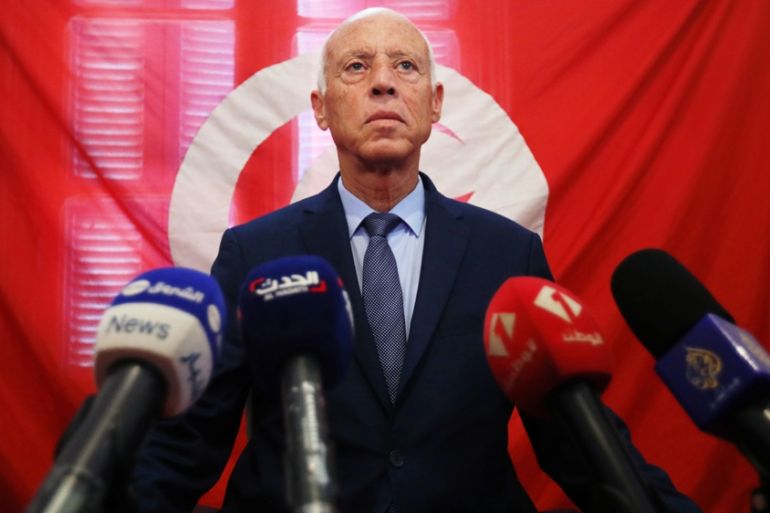Tunisia’s Kais Saied: ‘He’s just not interested in power’
Without a party or much funding, Saied has emerged as a frontrunner to lead Tunisia thanks to his ‘utopist’ programme.

Kais Saied is perhaps unlike any other aspiring leader in the Arab world. He is certainly different from the other 25 candidates that he beat in the first round of Tunisia‘s presidential election to advance to Sunday’s runoff vote.
The 61-year-old law professor barely ran a campaign, has no political party, and never held office.
Keep reading
list of 4 itemsA flash flood and a quiet sale highlight India’s Sikkim’s hydro problems
Ruling HDZ party wins most seats, but no majority in Croatia election
Croatians vote in election pitting the PM against the country’s president
He is honest about his rather controversial views, which he expresses without the slightest hesitation: Homosexuality is alien to Tunisian society, capital punishment should be maintained, and men and women cannot inherit equally.
And despite his meagre resources, Saied announced last week he would not campaign ahead of the second round of voting against then imprisoned media magnate Nabil Karoui, fearing it would give him an “unfair advantage”.
But far from holding him back, observers say it is this openness and obsession with equity that allowed him to emerge as the race’s frontrunner and may well see him elected president.
Selim Kharrat, president of Tunisian NGO Al Bawsala, said Saied’s popularity was in part fuelled by people’s disenfranchisement with a political system that has failed to address their core economic needs.
“The current atmosphere where many politicians are caught up in corruption scandals has helped this seemingly simple man,” Kharrat said, as he juxtaposed Saied’s austere profile with that of Karoui, who was arrested in late August on money-laundering and tax evasion charges.
“He’s received no funding from any of the big parties or [from] abroad, notably the better-off Arab Gulf countries, and this has shielded him from any suspicion,” he added.
Transformative vision
Saied first caught the public eye in the years following the 2011 revolution that toppled long-standing ruler Zine El Abidine Ben Ali.
As a constitutional law expert, he was often invited on television stations to help explain issues of public interest, which at the time mostly revolved around the drafting of the country’s 2014 constitution.
At the University of Tunis where Saied taught on and off since the early 1990s, students described him as a man of principle who welcomed disagreement.
As Tunisia grappled with a worsening security situation that threatened to derail its transition in 2013, it was not unusual for Saied to cancel lectures to listen to what students had to say.
|
|
He refused to vote in any of the parliamentary elections that have taken place since 2011, arguing the closed-list electoral system employed disproportionately favoured certain parties.
His vision for politics is as transformative as it is threatening to Tunisia’s political elite.
If elected, he has promised to decentralise government and the process through which representatives are elected to the popular assembly.
Tunisians would first elect small local councils who will then choose regional representatives. It will be up to these representatives to determine national leaders.
Parliamentarians’ mandate can be terminated if they fail to address their constituents’ needs in a vague process that the jurist himself has yet to explain.
‘Not interested in power’
With presidential prerogatives limited to foreign affairs and national defence, critics have accused Saied of being a populist.
They say his utopist project for a decentralised form of democracy will not hold water once he is sworn in and finds himself confronted with a parliament that will, in all likelihood, shoot down his proposals.
Mohamed Dhia Hammami, a Tunisian political analyst, said while one can question the feasibility of the project, the fact that his policies are popular with Tunisia’s youth does not make him a populist.
“He just doesn’t seem interested in power and isn’t giving any promises. He has all these ideas about reshaping the architecture of the state to increase the power of local government, which he’s been advocating for since 2011,” Hammami said.
“He’s one of a few who can offer radical change that isn’t just about bringing a few adjustments to the current system.”
Both Hammami and Kharrat pointed out that a much more fitting candidate for the populist label would be Karoui, who formed his Qalb Tounes party only a few months ago and has made extensive use of his Nessma TV channel throughout the past year to promote his philanthropic initiatives.
If voter demographics are anything to go by, the two presidential hopefuls’ distinct strategies have reaped completely – and not unexpectedly – different results, with poorer and less educated Tunisians voting for Karoui, and younger university graduates opting for Saied.
However, as the two candidates prepare to face off in a presidential debate on Friday, Tunisians on both sides of the aisle are left wondering how the results might affect stability in the Arab Spring‘s lone success story.